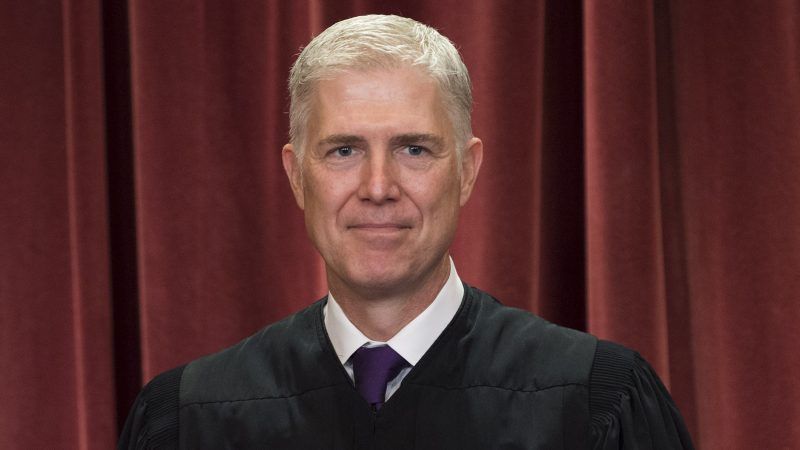Neil Gorsuch Disappoints Libertarians, Votes To Uphold Protectionist Liquor Law
The conservative justice would have permitted a nakedly anti-competitive regulation.

Supreme Court Justice Neil Gorsuch has generally received high marks from libertarian legal observers since joining the Supreme Court in 2017. That is due in part to Gorsuch's hawkish stance in Fourth Amendment cases, as well as to his sharp rulings against what he sees as executive and legislative malfeasance.
But Gorsuch had very few libertarian admirers this week when he voted in favor of upholding a nakedly protectionist state liquor law. In fact, Gorsuch's reasoning in the case put him directly at odds with a significant number of libertarian legal thinkers.
The case is Tennessee Wine & Spirits Retailers Association v. Thomas. At issue was a state law imposing a two-year state residency requirement on all applicants seeking a license to operate a liquor store. According to the Supreme Court's ruling, because this measure "blatantly favors the State's residents and has little relationship to public health and safety, it is unconstitutional."
Gorsuch disagreed. The Constitution allows "each State the opportunity to assess for itself the costs and benefits of free trade in alcohol," he insisted, even if that assessment results in "reduced competition and increased prices." As for the majority's view that the Tennessee regulation served no valid public health or safety purpose, Gorsuch countered that the protectionist measure might well benefit the public by "raising prices, and thus reducing demand" for alcoholic beverages.
Among the winning parties in Tennessee Wine & Spirits are a couple named Doug and Mary Ketchum, who own a store called Kimbrough Wine & Spirits. The Ketchums ran head first into the protectionist state law when they purchased that business in 2016, shortly after moving to Memphis from Utah. They retained the libertarian lawyers at the Institute for Justice (I.J.) to represent them in their legal fight against the Tennessee regulation.
In its brief to the Supreme Court, the I.J. legal team stressed a constitutional doctrine known as the "dormant Commerce Clause." In effect, this doctrine holds that the Commerce Clause, in addition to authorizing Congress to regulate economic activity between the states, also forbids the states from enacting any interstate economic barriers of their own.
"History has repeatedly demonstrated that states will not hesitate to engage in 'low-level trade war[s]' unless the judiciary stands ready to vigorously enforce the Commerce Clause's nondiscrimination principle," the I.J. lawyers argued. "In the face of persistent and creative state efforts to protect local economic interests, enforcement of that principle is the surest means of preventing the economic Balkinization that the Framers sought to avoid."
To understand what the framers sought to avoid, consider the words of James Madison. In Federalist 42, Madison explained that one of the main purposes behind the Commerce Clause was to clear away the various tariffs, monopolies, and other interstate economic barriers that the states had erected under the Articles of Confederation. In other words, one of the objectives of the Commerce Clause was to help create what we might refer to today as a domestic free trade zone. "A very material object of this power," Madison wrote, "was the relief of the States which import and export through other states from the improper contributions levied on them." Tennessee's protectionist liquor law fits that Madisonian definition of "improper."
This week's ruling in Tennessee Wine & Spirits is not the first time that the libertarians at the Institute for Justice have argued and won a dormant Commerce Clause case at the Supreme Court. In 2005, the I.J. team was among the winning litigators in Granholm v. Heald, which struck down protectionist state laws banning the direct sale of wine to consumers from out-of-state wineries. As I.J. lawyer (and current Arizona Supreme Court justice) Clint Bolick said during oral arguments, "Our clients," a small, family-run winery, "cannot compete with the liquor distributors in the political marketplace…. They can, however, compete in the economic marketplace. The Commerce Clause protects that right, that level playing field." According to Bolick, the regulations at issue deserved to be struck down because "the state is engaged, not in legitimate regulation, but in economic protectionism."
The Supreme Court agreed with Bolick.
Which brings us back to Gorsuch. In his Tennessee Wine & Spirits dissent, Gorsuch dismissed the dormant Commerce Clause as an "implied doctrine" and criticized it as a source of "judicial activism." In contrast to the position championed by the Institute for Justice, which called for the judiciary "to vigorously enforce the Commerce Clause's nondiscrimination principle," Gorsuch suggested that the Court should have stayed out of the matter entirely. "The regulation of alcohol wasn't left to the imagination of a committee of nine sitting in Washington," he wrote, "but to the judgment of the people themselves and their local elected representatives."
Thankfully for the libertarians, Gorsuch's view was the losing one this time around.


Show Comments (58)